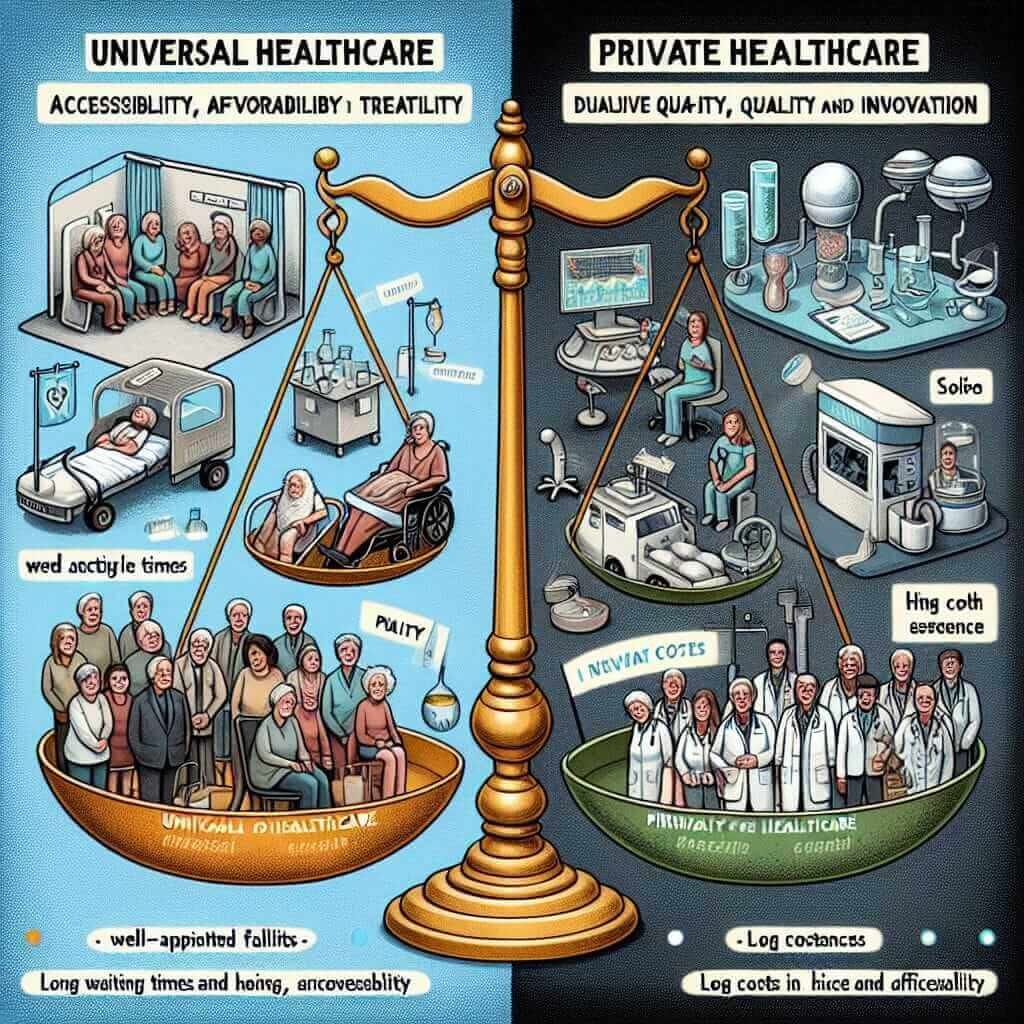The essay topic of government priorities, particularly the balance between healthcare and other sectors, frequently surfaces in IELTS Writing Task 2. This theme resonates with global concerns about resource allocation and societal well-being. Understanding the nuances of this topic and crafting a well-structured essay is crucial for IELTS test-takers aiming for band 7 and above.
This article examines this theme in-depth, providing a sample essay, vocabulary analysis, and writing tips to guide your IELTS preparation.
Sample Essay Topic
Some people argue that healthcare should be free for all citizens, while others believe that individuals should be responsible for their own medical expenses. Discuss both views and give your own opinion.
Essay Analysis
This essay prompt explores a classic argument: the role of the government in healthcare provision. It requires you to discuss two contrasting viewpoints:
- Healthcare as a right: This perspective emphasizes healthcare as a fundamental human right and advocates for universal, government-funded healthcare systems.
- Individual responsibility: This view stresses personal responsibility for health and advocates for private healthcare, where individuals pay for their medical expenses.
Your essay must navigate these perspectives while presenting a clear, well-reasoned opinion.
Model Essay
The question of who should bear the cost of healthcare is a complex and contentious one. While some advocate for free and universal healthcare, others believe individuals should be financially responsible for their own medical needs. This essay will delve into both sides of this debate before concluding that a balanced approach is most desirable.
Proponents of free healthcare argue that it is a fundamental human right, akin to education or security. They contend that everyone, regardless of their financial status, deserves access to quality medical care without facing financial hardship. This system, they argue, fosters a healthier and more equitable society, reducing the burden of medical debt and promoting overall well-being. For instance, countries with universal healthcare, such as Canada, generally report higher life expectancy and lower infant mortality rates compared to nations with primarily private healthcare systems.
Conversely, those advocating for individual responsibility in healthcare argue that it promotes personal accountability and prevents the overuse of medical services. They believe that when individuals bear the cost of their healthcare, they are more likely to make healthier lifestyle choices and utilize medical resources more judiciously. They also argue that private healthcare systems often lead to faster innovation and shorter wait times for treatment. For example, the United States, with its largely privatized healthcare system, is known for its cutting-edge medical technology and research.

While both sides present valid arguments, a balanced approach seems most pragmatic. Governments should strive to provide a basic level of healthcare for all citizens, covering essential services and protecting the most vulnerable populations. This could be achieved through a combination of public funding and affordable insurance schemes. Concurrently, individuals should be encouraged to take responsibility for their health through preventative measures and, where feasible, contribute to their medical expenses. This shared responsibility model can ensure both equitable access to healthcare and the sustainability of healthcare systems in the long run.
In conclusion, the debate surrounding healthcare funding involves complex ethical and economic considerations. While free healthcare for all might seem ideal, it presents significant financial challenges. Conversely, placing the entire burden on individuals can exacerbate inequalities and hinder access to essential care. Ultimately, a balanced approach that combines government provision with individual responsibility appears to be the most viable solution. (Word count: 324)
Writing Notes
- Structure: The essay follows a clear structure, addressing both sides of the argument before presenting a balanced opinion.
- Vocabulary: The essay utilizes sophisticated vocabulary, such as “contentious,” “proponents,” “accountability,” and “judicious,” showcasing a strong command of language.
- Examples: The essay incorporates relevant examples to support both perspectives, adding weight to the arguments presented.
- Grammar and Cohesion: The essay demonstrates excellent grammatical accuracy and cohesive devices, ensuring clarity and flow of ideas.
Vocabulary Highlights
- Contentious (adj.): /kənˈtɛnʃəs/ – causing or likely to cause disagreement.
- Proponent (n.): /prəˈpəʊnənt/ – a person who advocates a theory, proposal, or course of action.
- Accountability (n.): /əˌkaʊntəˈbɪləti/ – the fact or condition of being accountable; responsibility.
- Judicious (adj.): /dʒuːˈdɪʃəs/ – having, showing, or done with good judgment or sense.
- Equitable (adj.): /ˈɛkwɪtəbl/ – fair and impartial.
- Preventative (adj.): /prɪˈvɛntətɪv/ – designed to stop something undesirable from happening.
- Feasible (adj.): /ˈfiːzəbl/ – possible to do easily or conveniently.
- Exacerbate (v.): /ɪɡˈzæsə(r)beɪt/ – make (a problem, bad situation, or negative feeling) worse.
- Hinder (v.): /ˈhɪndə(r)/ – create difficulties for (someone or something), resulting in delay or obstruction.
- Viable (adj.): /ˈvaɪəbl/ – capable of working successfully; feasible.
Conclusion
Mastering the art of crafting well-structured essays on government priorities is crucial for IELTS success. Remember to analyze the prompt carefully, present balanced arguments, and utilize strong vocabulary and examples. Continuous practice, vocabulary building, and familiarizing yourself with diverse essay prompts will undoubtedly enhance your IELTS Writing skills.